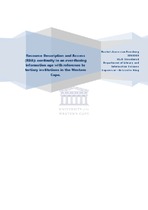| dc.contributor.advisor | King, Lizette | |
| dc.contributor.author | Janse van Rensburg, Rachel | |
| dc.date.accessioned | 2018-08-14T11:34:44Z | |
| dc.date.available | 2018-08-14T11:34:44Z | |
| dc.date.issued | 2018 | |
| dc.identifier.uri | http://hdl.handle.net/11394/6267 | |
| dc.description | Magister Library and Information Studies - MLIS | |
| dc.description.abstract | Although Resource Description and Access (RDA) has been discussed extensively amongst the
ranks of cataloguers internationally, no research on the perceptions of South African
cataloguers was available at the time of this research.
The aim of this study was to determine how well RDA was faring during the study's timeframe,
to give a detailed description regarding cataloguer perceptions within a higher education setting
in South Africa. Furthermore, to determine whether the implementation of RDA has overcome
most of the limitations that AACR2 had within a digital environment, to identify advantages
and/or perceived limitations of RDA as well as to assist cataloguers to adopt and implement the
new standard effectively.
The study employed a qualitative research design assisted by a phenomenological philosophy
to gain insight into how cataloguers experienced the implementation and adoption of RDA by
means of two concurrent web-based questionnaires.
The study concluded that higher education cataloguing professionals residing in the Western
Cape were decidedly positive towards the new cataloguing standard. Although there were some
initial reservations, they were overcome to such an extent that ultimately no real limitations
were identified, and that RDA has indeed overcome most of the limitations displayed by
AACR2. Many advantages of RDA were identified, and participants expressed excitement
about the future capabilities of RDA as it continues toward a link-data milieu, making library
metadata more easily available.
As this research has revealed a distinctly positive attitude from cataloguers' two main matters
for future research remains, being:
? Why South African participants in this study voiced almost no perceived limitations to
RDA as a cataloguing standard. Future research might be able to relay information
regarding this trend, especially in the light that it was not a global phenomenon.
? A deeper look might have to be taken at how participants' experienced RDA training
as this phenomenon might be closely linked to the reasons why the participants did not
mention more limitations. | |
| dc.language.iso | en | |
| dc.publisher | University of the Western Cape | |
| dc.subject | Anglo American Cataloguing Rules Second Edition (AACR2) | |
| dc.subject | Cataloguer | |
| dc.subject | Cataloguing | |
| dc.subject | Functional Requirements for Authority Data (FRAD) | |
| dc.subject | Functional Requirements for Bibliographic Records (FRBR) | |
| dc.subject | Resource Description and Access (RDA) | |
| dc.subject | Tertiary Institutions | |
| dc.subject | Western Cape, South Africa. | |
| dc.subject | Work, Expression, Manifestation and Item (WEMI) | |
| dc.title | Resource Description and Access (RDA): continuity in an ever-fluxing information age with reference to tertiary institutions in the Western Cape. | |
| dc.rights.holder | University of the Western Cape | |

